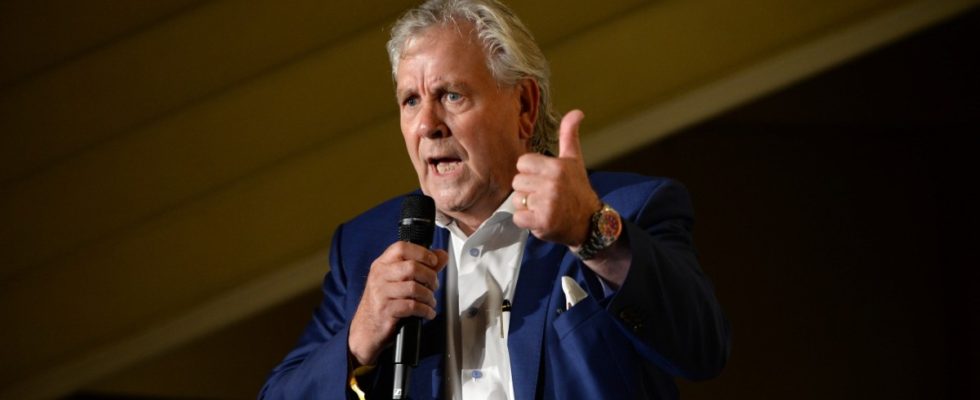The migration? “It’s just getting completely out of hand,” says Albert Duin, former state leader of the FDP. Cutting bureaucracy? No way, “laws are being produced on an assembly line and no one can see through them anymore.” The economic policy of the traffic light? A “chaos” created by “purely ideologically driven ideas, especially from the Greens.” At best, this federal government inspires “affluent city dwellers”. With an incendiary letter to Federal Finance Minister and FDP federal leader Christian Lindner, Duin fueled the debate about phasing out traffic lights. The statement that “the FDP prevented worse things from happening does not reassure anyone,” he wrote. Lindner’s sentence at the Jamaica negotiations in 2017 that it was “better not to govern than to govern incorrectly” has never been more appropriate than now.
The nationwide online member survey in the FDP via the traffic light started on Monday. Duin’s harsh lines are causing quite a stir. The FDP in the Free State particularly suffered from the damage to its image caused by the traffic lights and was thrown out of the state parliament, only three percent. What is the mood among Bavaria’s liberals?
Horst Meierhofer knows the fate that could blossom for the FDP. He was a member of the Bundestag when the Liberals governed with the Union – and was thrown out of parliament at the end of 2013. Today he is a city councilor in Regensburg and would consider withdrawing from the traffic lights to be a “complete declaration of bankruptcy”. Who should vote for the FDP next time if they shirk responsibility now that they have been elected? “We have to go through that now,” says Meierhofer. He “couldn’t see that many mistakes” in his party. It is now a matter of “rediscovering the spirit” in the coalition and “establishing a positive common attitude” again. Does he believe that the FDP member vote will cause the traffic lights to burst? “The danger is definitely there.”
Monika Bock is chairwoman of the FDP Munich-Land, a traditionally good place for the liberals. Bock also “absolutely” advocates staying in the traffic lights. Your party is the voice of reason in this government. “We need the FDP, which is sitting on the money, in the Finance Ministry.” Bock completely trusts Lindner and his State Secretary Katja Hessel, who has recently led the Bavarian FDP with Martin Hagen. Nevertheless, there are intensive discussions in her district association and many voices, depending on age, profession and background, everyone has their own personal perspective. Bock believes that this exchange of arguments is a sign of a “lively party, without any restrictions on thinking.”
“The FDP is good for the traffic lights. But the traffic lights are not good for the FDP.”
Jakob Schäuble, FDP city councilor in Ingolstadt and member of the state executive committee, says: “The traffic light is not a marriage of love.” There are some deficits, but the FDP has taken on a responsibility in government that cannot simply be given up without a solid reason. “As a member of the federal government, we have a responsibility for Germany,” says Susa Engeler, leader of the Young Liberals in Upper Bavaria. Every single member would have to take this into account when making their decision. Engeler and Schäuble perceive the mood as divided. Some are of the opinion that leaving the government would be better than continuing politics as before. Daniela Busse, chairwoman of the FDP in Kempten, feels great disappointment among many members. Many local groups are also struggling with resignations – because of the traffic lights. Busse herself is still unsure how she will vote. At the moment she is leaning towards getting out of the traffic lights. “The FDP is good for the traffic lights. But the traffic lights are not good for the FDP.”
State chief Martin Hagen already voted on Monday for the continued existence of the traffic lights. He understands the frustration about the alliance and shares it to some extent. But when it came to the question of voting with his gut or his head, he ultimately chose his head. An exit would “not solve any problems, neither in the country nor in the party.” And early elections could become a “threat to our existence.” A start for a better traffic light policy has also been made with the budget – for example, “the expansion of the welfare state cannot continue.”
Albert Duin says he has received “only positive” direct feedback so far. But he is also not known as someone who is persuaded and then falls over. The 70-year-old was state leader from 2013 to 2017. At the most recent party conference, he unexpectedly ran for office and was narrowly defeated. He now hopes for more “free thinkers” who are not “party vassals” dependent on positions. Former Science Minister Wolfgang Heubisch also recently spoke out in favor of ending the traffic lights. Like Duin, he does not believe that the FDP would be kicked out of the Bundestag in new elections. Duin is thinking more about gratitude among the electorate: “After all, we are the ones who will finally pull the plug.”

